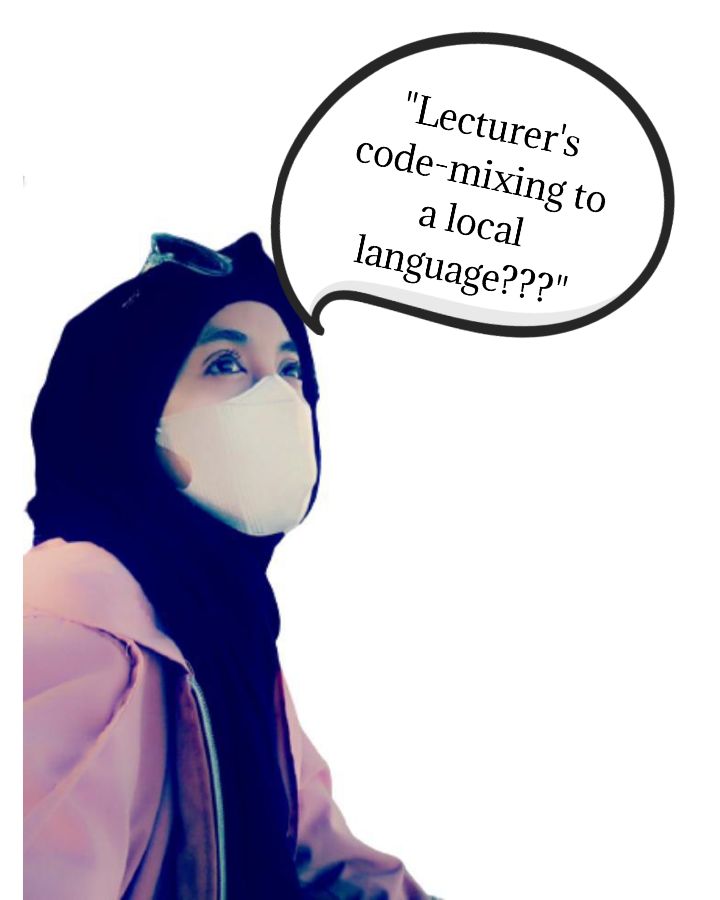The students' language attitudes towards lecturers' code mixing: An SFL study
DOI:
https://doi.org/10.21070/jees.v6i2.1642Keywords:
attitude, millenial, code-mixingAbstract
As the effort to have the insight into the existing status of a local language in Indonesia especially in the academic setting viewed as the respected discourse, this current study aims to delineate the attitudes of millennial students towards lecturer’s code mixing to Sundanese during courses. 42 responses reflecting respondents’ perspectives towards the issue were collected via qualitative questionnaire. To reveal the view of participants on the issue under the context of higher education, responses in the forms of 62 clauses were analysed by the transitivity framework of Halliday and Matthiessen. The findings of this SFL study shows that lecturer’s code mixing to Sundanese during courses were viewed by 74% of Sundanese and non-Sundanese participants in positive ways while the rest addressed it with negative attitude. The positive attitudes were respectively represented in material, mental, relational, and existential processes while the negative attitudes were constructed sequentially in relational, material and mental, verbal, and existential clauses. The main reasons in the positive attitudes as revealed by the transitivity analysis are associated with the needs to maintain and preserve local language especially Sundanese via the academic channel.
HIGHLIGHTS:
- The processes of meaning making in positive-attitude responses are realized especially in material clauses to establish the importance of preserving local languages especially Sundanese through the academic channel.
- The processes of meaning making in negative-attitude responses are realized especially in relational clauses to give priority to the negative impact of using Sundanese on the academic aspect especially for non-Sundanese students.
- The academic setting viewed as the respected world can be a medium for the co -existence of national, international, and local languages
Downloads
References
American Psychological Association. (2014). Recent generations focus more on fame, money than giving back. https://www.apa.org/news/press/releases/2012/03/fame-giving
Barr, S. (2020, September 29). What generation do you belong to? millennial, generation x or z. Independent. https://www.independent.co.uk/life-style/generation-definitions-what-am-i-millennial-generation-x-y-z-baby-boomers-golden-age-young-old-a8679741.html
Cambridge Dictionary (n.d). Attitude. In dictionary.cambridge.org. Retrieved March19, 2021, from /https://dictionary.cambridge.org/es/diccionario/ingles/attitude
Cambridge Dictionary (n.d). Millennial. In dictionary.cambridge.org. Retrieved March19, 2021, from /https://dictionary.cambridge.org/es/diccionario/ingles/millennial
Deal, J. J., Altman, D. G., & Rogelberg, S. G. (2010). Millennials at work : What we know and what we need to do ( If anything ). Journal of Business and Psychology, 25, 191–199. https://doi.org/10.1007/s10869-010-9177-2
Deliana, D., Ganie, R., & Raswiy, N. (2017). Language attitude and choice by Minangkabau community: A Sociolinguistic study in Medan. Bahasa Dan Seni: Jurnal Bahasa, Sastra, Seni Dan Pengajarannya, 45(1), 76–85. https://doi.org/10.17977/um015v45i12017p076
Ewing, M. . (2014). Language endangerment in Indonesia. International Journal of Education, 8(1), 12–22. https://doi.org/https://doi.org/10.17509/ije.v8i1.1764
Fitriati, A., & Wardani, M. M. S. (2020). Language attitude and language choice among students in Yogyakarta. International Journal or Humanity Studies, 3(2), 112–117. https://doi.org/https://doi.org/10.24071/ijhs.v3i2.2226.g1765
Halliday, M. A. K., & Matthiessen, C. M. I. M. (2004). An introduction to functional grammar (3rd ed.). Hodder Headline Group.
Hasibuan, L. F., Gurning, B., & Husein, R. (2018). Language attitude of Mandailingnese teenagers in desa Sidojadi kecamatan Bukit Malintang kabupaten Mandailing Natal. Linguistik Terapan, 15(2), 125–134. https://doi.org/https://doi.org/10.24114/lt.v15i2.12352
Hershatter, A., & Esptein, M. (2010). Millennials and the world of work: An economist’s perspective. Journal of Business and Psychology, 25, 211–223. https://doi.org/https://doi.org/10.1007/s10869-010-9160-y
Holmes, J. (2012). An Introduction to Sociolinguistics (4th ed.). Pearson Education Limited.
Kowske, B. J., Rasch, R., & Wiley, J. (2010). Millennials’ (lack of) attitude problem: An empirical examination of generational effects on work attitudes. Journal of Business and Psychology, 25, 265–279. https://doi.org/10.1007/sl0869-010-9171-8
Martin, J. R., Matthiessen, C. M. I. M., & Painter, C. (1997). Working with functional grammar. Arnold.
Rahayu, R., & Wibowo, E. (2018). Persepsi dan sikap bahasa masyarakat Lampung Selatan terhadap penggunaan bahasa Indonesia di harian Lampung Post. Tuah Talino, 12(1), 57–71. https://doi.org/https://doi.org/10.26499/tt.v12i1.1100
Reath. (1998). The language of newspapers. Routledge.
Richards, J. C., & Schmidt, R. (2002). Longman dictionary of language teaching and applied linguistics (3rd ed.). Pearson Education Limited.
Seli, S., & Kristi, S. (2020). Language choice and attitude in Sumatran-Javanese intermarriage families in relation to language maintenance in Lubuklinggau. Journal of English Education Literature and Linguistics, 3(1), 116–130. https://doi.org/https://doi.org/10.31540/jeell.v3i1.897
Wagiati, Riyanto, S., & Wahya. (2017). Sikap berbahasa para remaja berbahasa Sunda di kabupaten Bandung : Suatu kajian sosiolinguistik. Metalingua, 15(2), 213–221. https://doi.org/http://dx.doi.org/10.26499/metalingua.v15i2.62
Wulandari, D. (2012). The importance of positive language attitude in maintaining Javanese language. In A. Subyanto, Mualimin, & Prihantoro (Eds.), International Seminar Language Maintenance and Shift II (pp. 39–43). Universitas Diponegoro in collaboration with Balai Bahasa Jawa Tengah. http://eprints.undip.ac.id/54103/
Wulandari, D., & Sundari, W. (2012). Sikap bahasa santri pada konteks pemertahanan bahasa Jawa dalam proses pengajaran di pesantren (Study pada pesantren-pesantren di kota Semarang) (0596/023-04.2.16/13/2012).

Published
How to Cite
Issue
Section
License
Copyright (c) 2021 Marsandi Manar, Prapti Wigati Purwaningrum

This work is licensed under a Creative Commons Attribution 4.0 International License.







